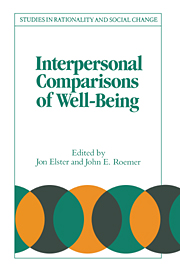Book contents
- Frontmatter
- Contents
- List of contributors
- Acknowledgments
- Introduction
- 1 The moral basis of interpersonal comparisons
- 2 Against the taste model
- 3 Utilitarian metaphysics?
- 4 Local justice and interpersonal comparisons
- 5 Notes on the psychology of utility
- 6 Adult-equivalence scales, interpersonal comparisons of well-being, and applied welfare economics
- 7 Interpersonal comparisons of utility: Why and how they are and should be made
- 8 A reconsideration of the Harsanyi–Sen debate on utilitarianism
- 9 Deducing interpersonal comparisons from local expertise Ignacio
- 10 Subjective interpersonal comparison
- 11 Utilitarian fundamentalism and limited information
- Index
1 - The moral basis of interpersonal comparisons
Published online by Cambridge University Press: 05 June 2012
- Frontmatter
- Contents
- List of contributors
- Acknowledgments
- Introduction
- 1 The moral basis of interpersonal comparisons
- 2 Against the taste model
- 3 Utilitarian metaphysics?
- 4 Local justice and interpersonal comparisons
- 5 Notes on the psychology of utility
- 6 Adult-equivalence scales, interpersonal comparisons of well-being, and applied welfare economics
- 7 Interpersonal comparisons of utility: Why and how they are and should be made
- 8 A reconsideration of the Harsanyi–Sen debate on utilitarianism
- 9 Deducing interpersonal comparisons from local expertise Ignacio
- 10 Subjective interpersonal comparison
- 11 Utilitarian fundamentalism and limited information
- Index
Summary
1. Interpersonal comparisons of welfare have been thought to raise two sorts of difficulties. First, such comparisons have been thought to involve value judgments of a kind that are not only out of place in positive economic science but also inappropriate as a basis for decisions of social policy. In addition, doubts have been raised about whether it is possible to make such comparisons at all, at least in a scientific manner, if what is to be compared are psychological states that are not open to observation. These two difficulties are related. Particular views about how to make the relevant kind of value judgments, and about how to avoid them, have led to the conclusion that what is to be compared are mental states of some kind: degrees of pleasure or happiness on the one hand, degrees of intensity or strength of preference on the other. Doubts then arise about whether comparisons of the relevant sort can in fact be made.
My own view is that, extreme forms of philosophical skepticism aside, there is no problem in general about the possibility of making interpersonal comparisons of happiness or of relative well-being. Within contemporary political philosophy and welfare economics, however, interpersonal comparisons present a problem insofar as it is assumed that the judgments of relative well-being on which social policy decisions, or claims of justice, are based should not reflect value judgments.
- Type
- Chapter
- Information
- Interpersonal Comparisons of Well-Being , pp. 17 - 44Publisher: Cambridge University PressPrint publication year: 1991
- 34
- Cited by



